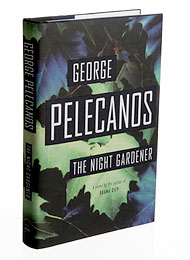
Coincidentally, the night before I had watched a couple of episodes of Season 3 of The Wire, and there are some remarkable similarities between the series and the novel.
For example, one of the secondary characters threading his way through Season 3 is Dennis "Cutty" Wise, just out after 14 years in prison. He's a hard man--or at least he was--and once back on the streets he tries to find his way in civilian life alternatively as muscle for a drug dealing organization and as casual labor cutting grass in the suburbs. Even he doesn't know which life he wants, what path he is capable of following, or how much latitude he has in deciding his own fate.
Switch to Chapter 12 of The Night Gardener, which opens with Conrad Gaskins, ex-con, walking out the clinic where he's just submitted a urine sample, a condition of his parole. ("Cutty" has a similar scene.) His younger cousin Romeo Brock, who is brash and bold but without Gaskins' experience in jail, is intent on involving the older man in his criminal enterprises. Gaskins wants to stay straight and stick with his grass-cutting job--"He even liked the way his back ached at the end of an honest day's work. Like his back was reminding him did something straight."--but he also owes his aunt (Romeo's mother) who raised him, and so he feels he has to stick with Romeo to keep him from getting killed.
But it's not merely the coincidence of the characters that momentarily had me thinking I already knew a character I'd only just met on the page: it's the whole vibe of the two stories. The novel and the series both feature realistic characters--police who are good and police who are bad or lazy or incompetent time-servers (and never 100% pure or evil), as well as criminals who come in a wide variety of types: some immoral, some amoral, some who would get out of the life if they only could or if dealing drugs did not pay so much better than, say, lawn care. (Actually, dealing drugs doesn't pay very well for the rank and file, but you try telling them that.)
Pelecanos' home ground is Washington D.C. and its surroundings; The Wire is set just up the highway in Baltimore. And the neighborhoods in both are much more alike than, say, Georgetown and the Inner Harbor are different.
Actually, the biggest reason for the similarities I noticed is obvious: Pelecanos is a writer-producer for The Wire, so it's no mystery that both the show and his book use a lot of the same storytelling tactics (like street slang that it sometimes takes quite a while to puzzle out) and character types.
But The Night Gardener, for all its charms (I'm not halfway through yet, so stay tuned for my final assessment), is not the novel I allude to in the title of this post. That book is Clockers (1992), by Richard Price.
As it happens, Price is also a writer on The Wire.

Clockers is about (imperfect) cops and drug dealers, competent and corrupt, devious and dumb as dirt. Set in fictional "Dempsey," a stand in for Jersey City, the novel follows jaded homicide detective Rocco Klein as he investigates a murder. Victor Dunham, a young hard-working family man confesses to the shooting, but Klein begins to suspect that Victor's brother, Strike, is the real killer.
Strike is the real center of the novel, the criminal with enough of a conscience--or maybe it's just not enough ice in his veins--that he's developed a nasty ulcer which he nurses with Yoo-Hoo.
The novel is rich with the kind of how-to detail--drug sales are physically handled by kids who don't risk serious jail time if arrested, smart cops know to tuck their neckties into their shirts before bending over a dead body--which The Wire and other cop shows now routinely get right, but that seemed really fresh when the novel came out.
Click here to read an excerpt from Clockers.
Janet Maslin wrote up a nice profile of Price and the work he did researching Clockers; click here to read it.
--Marshal Zeringue





